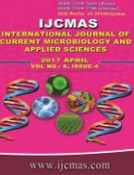


 National Academy of Agricultural Sciences (NAAS)
National Academy of Agricultural Sciences (NAAS)

|
PRINT ISSN : 2319-7692
Online ISSN : 2319-7706 Issues : 12 per year Publisher : Excellent Publishers Email : editorijcmas@gmail.com / submit@ijcmas.com Editor-in-chief: Dr.M.Prakash Index Copernicus ICV 2018: 95.39 NAAS RATING 2020: 5.38 |
The disease, papaya root rot, was found as an emerging serious threat causing 60-95 per cent yield loss. Fusarium solani was established as a causal organism for this root rot of papaya, first time reported from Bihar. Use of bio-control agents is an eco-friendly approach and a good option to manage the soil borne phyto-pathogens. These biological control agents either use the mechanism of antibiosis or mycoparasitism against the fungal pathogen. Evaluation of six species of Trichoderma and Pseudomonas fluorescens against Fusarium solani showed that all the test bio-agents significantly reduced the mycelial growth of Fusarium solani in vitro. The highest inhibition of radial growth was recorded in T.V.-1 (Pusa isolate) and in case of Pseudomonas fluorescens, the highest inhibition of growth of Fusarium solani was exerted by Pusa isolate of Pseudomonas fluorescens (local isolate). Among the native, Trichoderma harzianum isolate was found less effective as compared to native Trichoderma viride in suppression of radial growth of Fusarium solani throughout the period of observations. The similar trend was observed in case of commercial isolate of Trichoderma viride and Trichoderma harzianum
 |
 |
 |
 |
 |